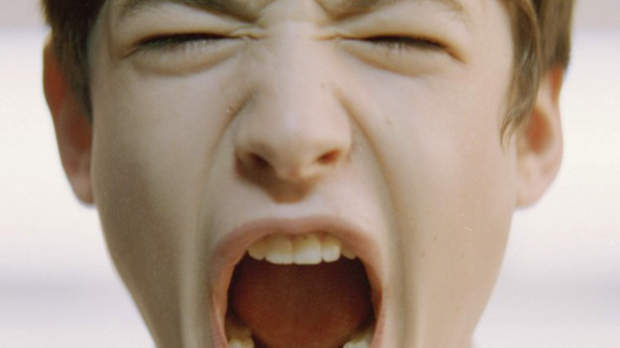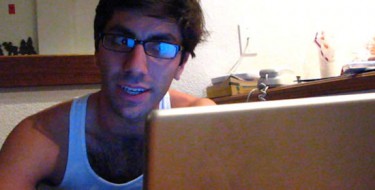 Back to selection
Back to selection
Things That Seem Real, Part One: A 3-Part Esaay on Catfish and other movies

Editor’s Note: The following essay contains major spoilers about the film Catfish.
Part One: Catfish and Reality
In the movie, the 14-year-old boy tells the school therapist that he likes to watch “little clips” on the computer, little videos. He describes them as “little clips of things that seem real.” Earlier in the film, we saw a montage of YouTube clips, from a cat playing piano to Saddam Hussein being hung to a baby laughing. Later in the film, the boy sees two girls die from a drug overdose right in front of him. How real that event does — or doesn’t — seem preoccupies us for the rest of the film.
Jean Baudrillard saw all this coming when he opened his seminal book Simulation and Simulacra with a Borges reference. Borges’ (very) short story, “On Exactitude in Science,” concerned an ancient empire where cartography had become so prized that a one-to-one map of the kingdom was created, covering it exactly. Baudrillard explained that not only has the “map” (read: the virtual world) become more privileged than the “territory” (actual reality) in contemporary life, but the map no longer needs a real-world model to base itself on — the map can be created ex nihilo. While once the virtual world produced things in response to reality, things can start in the realm of the virtual now, without any real-world referent.
We’re witnessing a wave of films that understand this. They are films made by the first wave of filmmakers who have used the internet during their developmental years. The aforementioned film, Antonio Campos’ Afterschool, displays an unnerving intimacy with the digital realm that marks a break with previous representations of the digital world in cinema. It was to be expected that films made by the Millennials (and younger generations to come) would have a different attitude toward technology than those made by filmmakers who were not digital natives, but was it obvious that younger filmmakers would be better suited to representing the digital universe onscreen?
Before Afterschool, cinema’s understanding of the digital realm was a less nuanced one. In films that utilized the internet as a key plot point, be they romantic comedies (You’ve Got Mail), action movies (Die Hard 4), or talkie dramas (LOL), the digital realm was always understood as being subservient to the “real world.” Characters use the net not for any pleasure or purpose that is self-contained within the net, but rather, they use it in order to affect specific things in their “real lives.” It’s used purely for utilitarian purposes.
Afterschool was the first film to successfully challenge that conception of internet-usage in cinema. As Time Out’s Mike D’Angelo wrote upon seeing it, the film “is how we live now.” The most affecting moments in the film come when we watch Rob, alone in his bedroom, poring over various video clips on YouTube, none with seemingly any meaning or relevance toward his life. Yet in fact, these videos take priority over everything else in Rob’s life; this virtual world attains a level of significance that “real life” cannot achieve. Ironically, Rob looks to the internet to find a connection, an interest in life. “A lot of the film was about him trying to feel the things that he sees in these videos in real life,” Campos told me in an interview we conducted back in December 2008. “Whether it be death, sex, et cetera. I think he’s just trying to feel something. The idea of reality — reality just doesn’t seem real enough. The videos he watches seem realer, I think, than his own life. That’s part of why we’re obsessed with YouTube. Life has all of these moments, you know? It’s so complicated and long and the moments come and go, but you can go online and see these things, (like) a baby laughing — it’s so heightened. I see my nephew laugh all the time, and it’s adorable, but there’s something so focused about seeing it in a 30 second clip.”
This misplaced prioritization can have tragic consequences. Rob has a habit of rewatching moments from his own life on YouTube — such as the girls’ death, which he accidentally filmed, and a fight he has with a classmate, filmed with someone’s cell-phone camera. It’s as if only through the distance provided by the digital buffer can he engage with his own experiences and actions. “Real life” is too immediate, too unmediated, too fraught with potential difficulty. The film’s truth emerges toward the end, when Rob produces a memorial video for the two girls he saw die. Neither a rote, formulaic by-the-numbers tribute (which the school later has another student produce) nor an impassioned, empathetic work of feeling, Rob’s video is an awkward, stuttering thing that feels completely authentic, and fairly devoid of any serious engagement with the girls’ deaths. Death on a video screen is one thing, but death in real life, for this young man, is too close, too personal, too nuanced to be completely grasped. Better to stick with little clips of things that seem real — even if they aren’t.
If Afterschool is the film that understands the complications of beginning to privilege digital reality over our non-digital lives, Catfish is the follow-up movie that understands the potential unleashed when that privileging is firmly secured. In Afterschool, we have a character who identifies with the content of online videos with greater ease than the content of his own life; in Catfish, we are introduced to Angela, a character who makes the content of a phantasmatic online realm become her own life.

So far, not much has been made of the extremely poetic potential inherent in the internet. With its various mechanisms, we can control how we look, how we sound, who are friends are, what we do, and frankly, just about anything else. It’s a movie-making machine with an unusual asset — it is provided with the currency of real life. It’s no surprise that people have been pretending to be other people for as long as the internet has been around; the medium is inherently geared toward misdirection, embellishment and the production of fantasy. It’s a device that allows us to pretend to be who we’ve always wanted to become. In most movies, the character who impersonates someone else over the net is a creep, a stalker, a villain; they have evilly created a new persona so as to lure in an unwitting victim, for example. The question Catfish poses, of course, shatters the mold: what if the bad guy wasn’t looking for a victim, per se? What if she was doing it for her own sake? To compensate for a lack in her own life? In doing so, Catfish turns the most common net-villain paradigm on its head, and forces the audience to empathize with a character who could have been easily demonized.
“A lot of the personalities that came out were just fragments of myself,” Angela explains to Yaniv Schulman, the young man she’s been conducting an internet romance with (unbeknownst to him), toward the end of Catfish. “Fragments of who I used to be. With the boys and Vince, I gave up a lot of myself. Sometimes I don’t know who I am.”
Catfish is the story of a woman — Angela — who isn’t old enough to have fully hit middle age, but isn’t young enough to be holding on to the dreams of her youth any longer. Creative inclinations abound in her — she paints, she used to want to be a ballet dancer, and she certainly has a gift for narrative storytelling. She begins her relationship with Yaniv by reaching out to him under the auspices of her 9-year-old daughter, Abby, who she explains to Yaniv is a painting prodigy. Yaniv, a photographer, sends Angela photos of his, and Angela sends back paintings that Abby has done of the photos. Soon enough, Yaniv is beginning a correspondence with Abby’s older sister, Megan, a beautiful singer and dancer. They begin something of an internet romance.
Catfish’s twist could have been an obvious one: after corresponding for months and building up a digital-only romance (complete with some absurd “sext messaging”), Yaniv and the two filmmakers (Yaniv’s brother Ariel and their friend Henry Joost) journey to Michigan to find out that in fact, Megan was Angela’s creation. In fact, that is the case, but Catfish’s story goes much further than that — Angela created not only Megan, but an entire digital world — 12 or 13 fake people, in total, each with their own Facebook profile, backstory and current narrative. Many of them have their own special gifts. Abby, in this parallel universe, is a gifted painter (Angela does really have a 9-year-old named Abby, but she’s no painter — Angela makes them). Megan is a beautiful singer (the songs of “Megan’s” that Yaniv is sent are just taken off of the internet, YouTube covers and the like). Megan’s “brother” is in a band. And so on. Each identity is a fragment, a trace of something once desired, and lost, on Angela’s behalf. The world she’s created is a parallel universe, where she can indulge in her own passions and interests in a way her “real life” would never allow. It’s an opportunity for her to explore the fantasy of a life that could have been. Speaking about making Megan a dancer, she explains (roughly), “I wanted to be a dancer when I was younger. But I was stupid. I partied too much, made some bad decisions.”
Here, then, is the therapeutic power of the internet: it enables us to lead lives we never could have lived otherwise, inhabit existences we’ve only dreamed about. The depth and richness of virtually created lives is such that the distinctions between our “real life” and our virtual existence starts to blur; we see it when we watch Angela watch Yaniv — she has fallen in love with him through the avatar of a nonexistent person, but no one can mistake the real, physical gaze directed at the real-life Yaniv for anything short of love. “You have such beautiful eyes,” she tells him numerous times as she paints his portrait in her home. “Such a nice smile.” The tenderness in her delivery might just about break your heart. Angela is unsure of where the virtual world ends and her “real life” begins; indeed, she may have lost track of the distinction entirely by this point.
This, of course, is ultimately the tragedy of Catfish — that Angela’s reality is more based in fantasy than in her own life. Because Angela is not a ballet dancer; she is not a painter whose works go for thousands of dollars; she is not a gifted musician. What she is, and where her talents may in fact lie, is something that one exits Catfish without fully grasping — she is so intent on presenting herself as who she wants to be that we get little sense of her, except for her regrets and fantasies. She has decided to live in the land of the map, rather than on the territory itself.
What’s truly profound about Angela’s situation is that it is hardly unique or exemplary; indeed, it is merely an extreme version of the place most of us, assuming we have an internet connection and the free time to use it, find ourselves in every day. As the internet continues to absorb more of our time, we begin to live as it wants us to live — as individuals whose existences are more fully developed in the fantasy-worlds of the net than in what we call “real life.” We go on Amazon.com to find out what books we are interested in; we go on Facebook to find out what our friends and family are up to; we go on eHow to find out how to tie a tie; we go on Gchat to socialize; and so on, and so on. Things that in the past would have required some modicum of human interaction (like going to the bookstore and talking with an employee, or asking your dad for the specifics of a four-in-hand knot) now require nothing more of us than to stay put, in our offices, our bedrooms, staring at the screen that will somehow beam ourselves back at us. Like Angela, we do not — and perhaps cannot — go into the world and change the coordinates of our lives. Better to rule a community of one, a private kingdom of ourselves that we oversee from the safety of our homes. It may not seem very impressive to an outsider, but it seems real to us — and hey, that’s all that matters, right?
Top Photo: Ezra Miller in writer-director Antonio Campos’ Afterschool. Courtesy of IFC Films.
Tomorrow: “Things That Seem Real, Part Two: Catfish and Fantasy”
Zachary Wigon is a New York-based screenwriter and film critic. Since graduating from NYU’s film school in 2008, he has contributed writing on film to The L Magazine, The Onion A/V Club, NYLON magazine and The House Next Door, amongst other outlets. His first feature screenplay, For Your Entertainment, is currently in pre-production.

